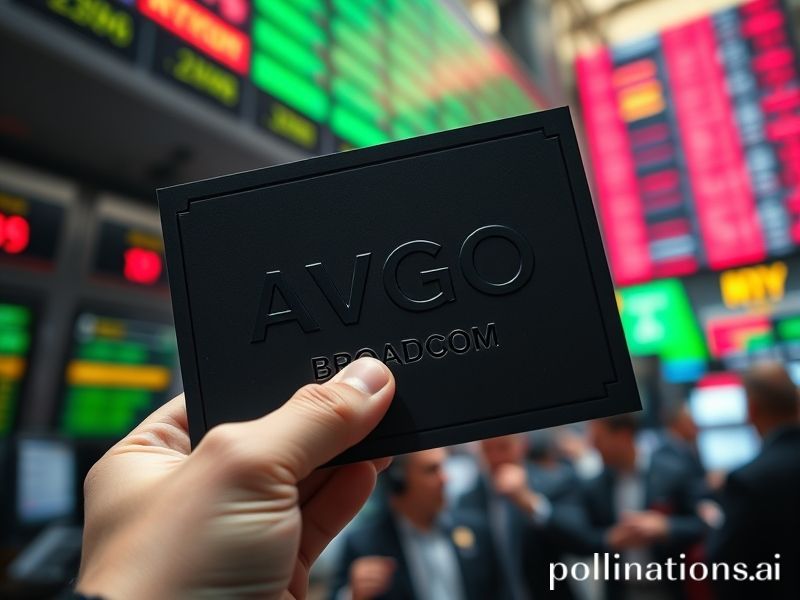Broadcom Stock: The Global Loan Shark Silicon Valleys Forgot to Regulate
Broadcom’s Surge: How a Silicon-Valley Chipmaker Became the World’s Quiet Loan Shark
By Our Man in Singapore, who has watched empires rise on smaller margins than Broadcom’s licensing fees.
HONG KONG—While diplomats bicker over tariffs and TikTok, the real global power play is happening inside a beige box in San Jose. Broadcom Inc., the company your phone never thanked, has quietly turned itself into the IMF of semiconductors—lending indispensable tech to anyone with a pulse and a licensing budget, then tightening the screws with the gentle bedside manner of a mafia accountant. Its stock, up roughly 60 % year-to-date in dollar terms, now behaves like a Swiss bank account wearing a hoodie: staid on the surface, but capable of moving entire nation-state GDPs on the whisper of an AI accelerator order.
To understand why Finnish pension funds and Saudi sovereign wealth vehicles alike check Broadcom’s ticker before breakfast, consider the physics of modern desire. Every server rack from Dublin to Djibouti is being retrofitted to hallucinate like ChatGPT. Broadcom doesn’t make the GPUs that dream in silicon—that’s Nvidia’s circus—but it sells the custom chips that herd those dreams into orderly data-center corrals. It also sells the switches, the SerDes transceivers, and the baroque licensing agreements that make Ethernet standards read like the Talmud. In short, if Nvidia is the cocaine, Broadcom is the rolling paper, the razor blade, and the guy who reminds you he knows where your kids go to school.
The geopolitical punchline is exquisite. Washington wants to choke Beijing’s access to advanced chips; Beijing wants to choke Washington’s access to cheap TikTok data. Both sides still queue up at Broadcom’s window, because custom ASICs—like black-market kidneys—are non-partisan. When the U.S. Department of Commerce added yet another layer of export controls last October, Broadcom simply rerouted shipments through “friend-shoring” assembly plants in Penang and Guadalajara, proving that globalization is dead only in PowerPoint decks. The stock popped 8 % the next morning, as analysts upgraded the company’s “sanctions-resilience multiple,” a metric previously thought to exist only in satire.
Europe, ever the fretful chaperone, watches from the sidelines clutching its €750 billion Green Deal purse. Brussels has promised to build “sovereign” semiconductor fabs by 2030, a timetable so leisurely it might as well be a medieval monastery copying manuscripts. Meanwhile, European carmakers—who still believe a Golf R is high tech—pay Broadcom’s automotive division protection money for chips that keep their infotainment systems from rebooting into Lithuanian every Tuesday. Each royalty check is another small defeat for the idea of European strategic autonomy, and another tick upward for AVGO.
Emerging markets get the darkest joke of all. India’s tech unicorns, drunk on SoftBank and hubris, brag about digital sovereignty while running on Broadcom Tomahawk switches stacked in Noida server farms. Jakarta’s ride-hailing super-app GoTo could lose another billion dollars this quarter, but its real existential risk is Broadcom jacking up prices on the silicon that times every ojek pickup. When your national digital infrastructure is a variable-rate mortgage held by a company whose CEO once joked that “Moore’s Law is actually Moore’s Suggestion,” sovereignty starts to feel like a slogan on a conference lanyard.
Even the climate, that abused afterthought, is roped in. Training a single large language model emits as much CO₂ as a transatlantic flight, and Broadcom’s switches make those training runs possible. ESG funds therefore face the exquisite moral contortion of simultaneously divesting from oil majors and piling into Broadcom because it’s “AI-enabling.” Somewhere, a polar bear files the irony under “not my problem.”
So what happens next? Analysts speak of a $1,000 share price by 2025, which in Tokyo trading sessions is already being priced in yen, won, and whatever cryptocurrency El Salvador is pretending is legal tender this week. The risk, of course, is that the AI bubble bursts, or Washington finally drafts export rules smart enough to matter, or customers decide that paying 5 % of revenue to the Broadcom licensing mafia is a bad look in a recession. But as any good loan shark knows, once the client is hooked on 800-gigabit Ethernet, the exit fee is always higher than the vig.
Until then, Broadcom’s stock remains the world’s blackest box of joy: a cynical bet that humanity’s hunger for bandwidth will outrun its talent for self-sabotage. Given the evidence so far, it’s a wager only a pessimist would refuse.







